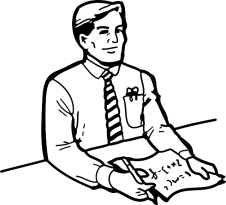Oh, let’s make this easy: you’re both. Some of you don’t want to read this, and I think telling you that you’re both may either help you keep reading, nod your head that you think you know where this is going, or at least to head off to Wikipedia.
I was on a quest one day. I had to deliver a precious treasure to its destination. I braved indifferent throngs of people, fed enchanted metal discs to a tiny regulatory guard-beast, and all of this before breakfast. Ok, ok, it was a piece of paper going to a bureaucrat outside of whose location was a parking meter. Not as exciting. The bureaucrat wanted something in particular and chose to send me on another quest which might have ended badly if I chose poorly in how to correct the errors on the intended form. The bureaucrat seemed to get pleasure out of hindering me- and not because the bureaucrat had to. But after encountering this difficulty of arbitrary and dubious motivation, I decided to realize that I have just such an opportunity many times per day also. I have the chance to help or hinder.
This person chose not to help me along, but to send me away to come back and try again with a silly technicality. I like to think about how I feel right before I feel something- although it’s not always conscious and/or slow enough for such a process. I like to practice mindfulness about my emotional states and thus choose how I feel. I knew at this moment that I could try and pull rank in some way; to cause a big reveal, get revenge, put the bureaucrat in the bureaucrat’s place (whatever that is..); that was certainly one choice, and one that comes automatically to some of us in some situations. But while thinking about this, I wondered what a victory most profound would look like for me. The most dramatic response to being hindered is to help.
I held doors for people, I helped someone with a bureaucracy of their own, I let people in front of me, I smiled a lot, I left a huge tip, I complimented someone random (which is hard because I’m generally an introvert), and I did someone a favor. It was a nice helpful day for me. When I felt I had power in any given situation, I tried to give power to someone else. It was kind of .. powerful. Kinetic energy is measurable only through its motion. Unused power is potential- and does nobody any good. By giving my power to other people, I released the need to hinder by helping. And for that, I am thankful that I met the bureaucrat’s hindrance that day. For that day, the bureaucrat helped me not to hinder, but to mindfully help. And so I was simultaneously powerfully powerless- I was both helped and hindered.
I’m not perfect. I’m pretty sure I’ve snarled at someone since then. But it isn’t really energizing to me to be angry or to shut someone down. What’s energizing for me is to use my choice to its greatest potential and to be a help. We have a choice in our workplaces, our homes, out in public, in cyberspace, among strangers and in our relationships; to help or to hinder. It’s all binary: yes or no- but we also have the profound kinetic potential to turn hindrance into help. And that is empowering.
Now go look up Schrödinger’s cat, if you haven’t yet.





